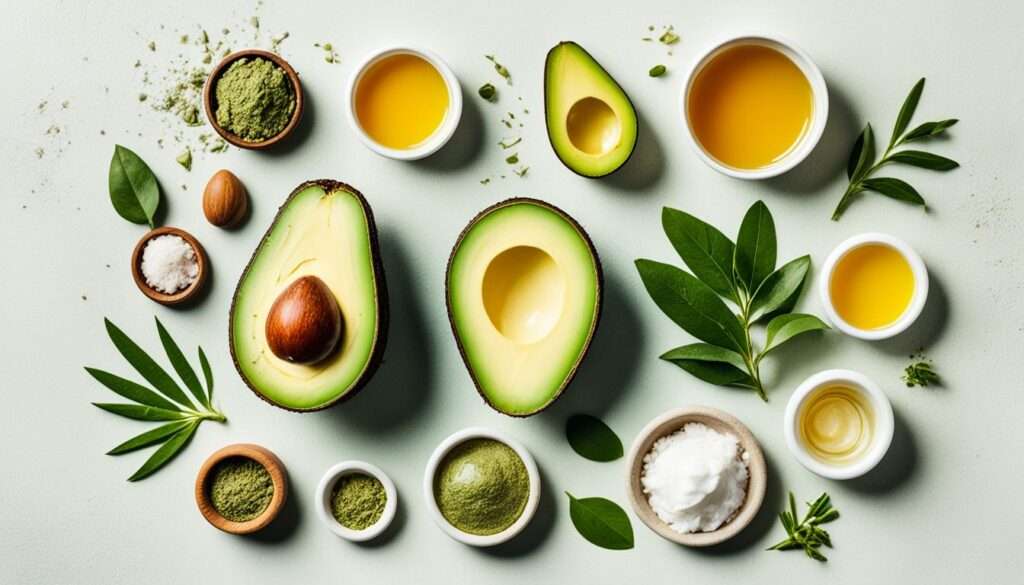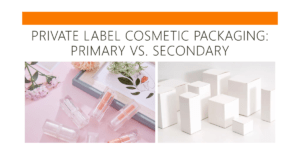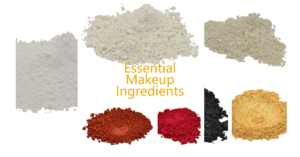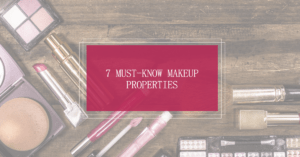Skincare ingredients play a crucial role in achieving flawless skin. In this article, we will explore five must-have private label cosmetic ingredients that can elevate your skincare routine. These ingredients have been carefully selected for their beneficial properties and their ability to address various skin concerns. By incorporating these ingredients into your skincare regimen, you can enjoy a radiant complexion and maintain healthy and beautiful skin.
Table of Contents
Key Takeaways:
- Private label cosmetic ingredients are essential for achieving flawless skin.
- These carefully selected ingredients have beneficial properties that can address various skin concerns.
- Incorporating these ingredients into your skincare routine can help you achieve a radiant complexion.
- Maintaining a comprehensive skincare regimen is crucial for maintaining healthy and beautiful skin.
5 Must-Have Private Label Cosmetic Ingredients for Flawless Skin NO.1 – Hyaluronic Acid
Hyaluronic acid is a powerful ingredient known for its excellent hydrating properties. It has the ability to attract and retain moisture in the skin, keeping it plump, supple, and well-hydrated. This helps to improve skin texture, reduce the appearance of fine lines and wrinkles, and enhance the overall appearance of the skin.
Incorporating hyaluronic acid into your skincare routine can provide numerous benefits for your skin. It helps to:
- Hydrate and moisturize the skin
- Improve skin elasticity and firmness
- Reduce the appearance of fine lines and wrinkles
- Enhance skin’s natural barrier function
- Plump and smooth the skin
To fully reap the benefits of hyaluronic acid, it’s important to use products specifically formulated with this ingredient. Look for hyaluronic acid in serums, moisturizers, and face masks. Incorporating hyaluronic acid into your skincare routine is simple and can make a noticeable difference in the overall health and appearance of your skin.
| Benefits of Hyaluronic Acid |
|---|
| Hydrates and moisturizes the skin |
| Improves skin elasticity and firmness |
| Reduces the appearance of fine lines and wrinkles |
| Enhances skin’s natural barrier function |
| Plumps and smooths the skin |
5 Must-Have Private Label Cosmetic Ingredients for Flawless Skin NO.2 – Vitamin C
Importance for Skin Health
Vitamin C is a vital ingredient for maintaining healthy and youthful-looking skin. With its powerful antioxidant properties, vitamin C helps protect the skin against free radical damage caused by environmental factors such as pollution and UV radiation.
One of the key benefits of vitamin C is its role in collagen synthesis. Collagen is a protein responsible for maintaining skin firmness and elasticity. As we age, collagen production naturally decreases, leading to the appearance of fine lines and wrinkles. By incorporating vitamin C into your skincare routine, you can support collagen production and maintain a smoother and more resilient complexion.
Another advantage of vitamin C is its ability to brighten the skin and improve uneven skin tone. It inhibits the production of melanin, the pigment responsible for dark spots and hyperpigmentation, resulting in a more even and radiant complexion.
Tips for Incorporating Vitamin C into Your Skincare Routine
To reap the benefits of vitamin C for your skin, consider the following tips:
- Choose a Vitamin C Serum: Look for a high-quality vitamin C serum that contains a stable form of vitamin C, such as L-ascorbic acid. Serums are highly concentrated and can penetrate deep into the skin for maximum effectiveness.
- Apply in the Morning: Vitamin C works synergistically with sunscreen to provide enhanced protection against UV damage. Apply your vitamin C serum in the morning after cleansing and toning, followed by a broad-spectrum sunscreen with SPF.
- Start Slowly: If you’re new to using vitamin C, start with a lower concentration to allow your skin to acclimate. Gradually increase the concentration over time as your skin adjusts.
- Store Properly: Vitamin C is sensitive to light and air, so store your serum in a dark, airtight container to maintain its potency.
- Be Consistent: Incorporate vitamin C into your daily skincare routine for optimal results. Consistency is key when it comes to achieving healthier and more radiant skin.
By harnessing the power of vitamin C in your skincare routine, you can protect and enhance the health of your skin, resulting in a more youthful and glowing complexion.
5 Must-Have Private Label Cosmetic Ingredients for Flawless Skin NO.3 – Retinol
Understanding Retinol
Retinol, derived from vitamin A, is renowned for its remarkable anti-aging properties. This powerful ingredient stimulates collagen production, effectively reduces the appearance of fine lines and wrinkles, and enhances skin cell turnover. However, it is crucial to comprehend the mechanisms and proper usage of retinol to avoid any adverse effects. In this section, we will provide a comprehensive understanding of retinol and delve into its numerous benefits for the skin. We will also offer guidance on selecting and utilizing retinol products based on individual skin types.
Retinol cream is a popular choice for incorporating retinol into your skincare routine. Its potent formulation enables deep penetration into the skin, stimulating collagen synthesis and visibly reducing the signs of aging.
5 Must-Have Private Label Cosmetic Ingredients for Flawless Skin NO.4 – Niacinamide
Niacinamide, also known as vitamin B3, is a versatile ingredient that offers a wide range of benefits for the skin. Incorporating niacinamide into your skincare routine can help you achieve a healthier, more radiant complexion. Let’s explore the numerous benefits of niacinamide and how it can transform your skin.
Benefits of Niacinamide
Niacinamide is a powerhouse ingredient that can address multiple skin concerns. Here are some of the key benefits:
- Improves skin texture: Niacinamide helps to refine the skin’s texture, making it smoother and more even-toned.
- Reduces the appearance of pores: Niacinamide has been found to reduce the size of pores, resulting in a more refined and polished appearance.
- Regulates oil production: If you struggle with oily skin, niacinamide can help regulate sebum production, keeping your skin balanced and shine-free.
- Enhances skin barrier function: Niacinamide strengthens the skin’s protective barrier, reducing moisture loss and improving overall skin health.
- Reduces hyperpigmentation: Niacinamide has been shown to lighten dark spots and hyperpigmentation, resulting in a more even and luminous complexion.
- Soothes skin inflammation: Whether you have sensitive or acne-prone skin, niacinamide’s anti-inflammatory properties can help calm redness and irritation.
To harness the power of niacinamide, consider incorporating a niacinamide serum into your skincare routine. Look for products with a concentration of 5-10% niacinamide for optimal results. Remember to always patch test new products and consult with a dermatologist if you have any specific skin concerns or conditions.
Now, let’s dive deeper into the world of SPF (Sun Protection Factor) and explore its role in skincare.
5 Must-Have Private Label Cosmetic Ingredients for Flawless Skin NO.5 – SPF (Sun Protection Factor)
When it comes to maintaining healthy and youthful-looking skin, sun protection is paramount. The sun emits harmful ultraviolet (UV) radiation that can cause premature aging, sunburn, and even skin cancer. That’s where SPF, or Sun Protection Factor, comes into play. SPF is a measure of how well a sunscreen can protect the skin from UVB radiation, which causes sunburn.
Using SPF skincare products, particularly sunscreen, is crucial in shielding your skin from the damaging effects of the sun. Sunscreen acts as a protective barrier, preventing harmful UV rays from penetrating the skin and causing damage.
So, how do you choose the right SPF product for your skin? Consider the following tips:
- Look for a broad-spectrum sunscreen that protects against both UVA and UVB rays.
- Opt for a sunscreen with an SPF of 30 or higher for adequate protection.
- Apply sunscreen generously to all exposed areas of the body, including the face, neck, arms, and legs.
- Reapply sunscreen every two hours or more frequently if you’re sweating or swimming.
- Consider using SPF-infused skincare products such as moisturizers, foundations, and lip balms to ensure continuous sun protection.
Remember, sun protection is a year-round commitment, even on cloudy days. Incorporating SPF into your daily skincare routine is essential for maintaining healthy and protected skin.
Natural Oils and their Benefits
Natural oils offer numerous benefits for the skin. They are rich in essential fatty acids, vitamins, and antioxidants that help nourish, hydrate, and protect the skin. Incorporating natural oils into your skincare routine can promote a healthy and radiant complexion.
Types of Oils
There are various types of natural oils commonly used in skincare, each with its own unique properties and benefits for the skin. Here are some popular natural oils and their specific benefits:
1. Argan Oil:
Argan oil is rich in antioxidants and essential fatty acids, making it a great choice for moisturizing and nourishing the skin. It helps improve skin elasticity, reduce the appearance of fine lines and wrinkles, and promote a youthful complexion.
2. Jojoba Oil:
Jojoba oil closely resembles the natural oils produced by the skin, making it an excellent moisturizer for all skin types. It helps balance oil production, soothe inflammation, and protect the skin’s barrier function. for example, MetaCNBeauty Private label cosmetics concealer cream Made with refined olive oil, olive pomace oil, and jojoba seed oil, this concealer not only provides long-lasting makeup but also nourishes and moisturizes your skin, delaying aging and resisting wrinkles. learn more about jojoba seed oil used in cosmetics products here
3. Rosehip Oil:
Rosehip oil is packed with vitamins A and C, as well as essential fatty acids. It helps improve skin texture, fade scars and hyperpigmentation, and promote a more even skin tone. It also has anti-inflammatory properties that can calm irritated skin.
4. Tea Tree Oil:
Tea tree oil is well-known for its antibacterial and antiseptic properties. It is especially beneficial for acne-prone skin as it can help reduce inflammation, fight bacteria, and unclog pores. However, it should always be used in diluted form.
5. Lavender Oil:
Lavender oil is known for its calming and soothing properties. It can help alleviate stress, promote relaxation, and improve sleep quality. In skincare, it also has antioxidant benefits and can aid in reducing skin redness and inflammation.
Incorporating natural oils into your skincare routine is easy. You can use them as a facial moisturizer, add a few drops to your regular skincare products, or even create DIY face masks and serums. However, it’s important to note that natural oils may not be suitable for everyone, especially those with specific skin conditions or sensitivities. It’s always best to perform a patch test and consult with a dermatologist if you have any concerns.

Diet and Hydration
Impact on Skin Health
Diet and hydration are crucial factors when it comes to achieving and maintaining healthy skin. The foods you consume and the amount of water you drink directly influence the appearance and health of your skin. In this section, we will explore the impact of diet and hydration on skin health, discuss the foods that promote flawless skin, and provide tips for staying hydrated to optimize your skin’s well-being.
The foods you eat play a significant role in nourishing your skin from within. Consuming a well-balanced diet that is rich in essential nutrients can help promote healthy skin and improve its overall appearance. Incorporating certain foods into your diet can provide targeted benefits for your skin, addressing specific concerns such as acne, aging, and dullness.
Here are some examples of foods that are beneficial for achieving flawless skin:
- Fatty fish: Rich in omega-3 fatty acids, fatty fish like salmon and mackerel help keep the skin hydrated and supple.
- Avocados: Packed with healthy fats and antioxidants, avocados promote skin elasticity and reduce inflammation.
- Green leafy vegetables: Spinach, kale, and other leafy greens are excellent sources of vitamins, minerals, and antioxidants that nourish the skin and protect it from damage.
- Berries: Blueberries, strawberries, and other berries are high in antioxidants, which help fight free radicals and reduce skin aging.
- Nuts and seeds: Almonds, walnuts, chia seeds, and flaxseeds are rich in essential fatty acids and vitamins that support skin health.
- Watermelon: With its high water content, watermelon helps hydrate the skin and flush out toxins.
In addition to a healthy diet, proper hydration is essential for maintaining healthy and radiant skin. Drinking an adequate amount of water throughout the day helps keep your skin moisturized, improves its elasticity, and flushes out toxins. Aim to drink at least eight glasses of water per day to stay hydrated and support optimal skin health.
Staying hydrated goes beyond just drinking water. Other hydrating beverages and foods, such as herbal teas, fresh fruits, and vegetables with high water content, can also contribute to maintaining hydrated skin.
By paying attention to your diet and ensuring proper hydration, you can support your skin’s health from the inside out, promoting a clear, glowing complexion.
| Food | Benefits for the Skin |
|---|---|
| Fatty fish | Hydrates the skin and improves suppleness |
| Avocados | Promotes skin elasticity and reduces inflammation |
| Green leafy vegetables | Nourishes the skin with essential nutrients and protects against damage |
| Berries | Rich in antioxidants, reduces skin aging and fights free radicals |
| Nuts and seeds | Provides essential fatty acids and vitamins for healthy skin |
| Watermelon | Hydrates the skin and detoxifies the body |
The Role of Sleep in Skin Health
Sleep and Skin Repair
Quality sleep is essential for overall health, including skin health. During sleep, the body undergoes a process of repair and regeneration, which is crucial for maintaining healthy and youthful-looking skin. Sleep deprivation can lead to various skin issues such as dullness, fine lines, and uneven texture.
When you sleep, your body produces collagen, a protein responsible for maintaining skin elasticity. Lack of sleep can disrupt collagen production, leading to a loss of skin firmness and the development of wrinkles. Additionally, inadequate sleep affects the skin’s ability to retain moisture, resulting in dryness, flakiness, and a dull complexion.
The skin also goes through a natural exfoliation process during sleep, shedding dead skin cells and revealing a fresher layer underneath. Insufficient sleep can disrupt this process, causing a buildup of dead skin cells, clogged pores, and potential acne breakouts.
Furthermore, sleep is essential for balancing the body’s stress hormones, such as cortisol. High levels of cortisol can trigger inflammation in the skin, exacerbating conditions like acne, eczema, and psoriasis.
To prioritize skin health, it is crucial to establish a good sleep routine. Aim for 7-9 hours of uninterrupted sleep each night and create a relaxing bedtime ritual. Avoid using electronic devices before bed, as the blue light emitted from screens can interfere with your sleep cycle.
Here are some tips for better sleep to support skin health:
- Create a calming nighttime routine, such as taking a warm bath or practicing meditation.
- Keep your bedroom cool, dark, and quiet to promote a restful sleep environment.
- Avoid consuming caffeine or stimulating substances close to bedtime.
- Establish a consistent sleep schedule, going to bed and waking up at the same time each day.
- Incorporate relaxation techniques, such as deep breathing or listening to soothing music, to unwind before sleep.
By prioritizing quality sleep, you can support the natural repair and rejuvenation processes of your skin, leading to a more vibrant, youthful complexion.
Stress Management for Skin Health
Stress can have a detrimental effect on skin health, leading to various skin issues such as acne, eczema, and premature aging. Managing stress is crucial for maintaining healthy and clear skin. The mind and body are deeply interconnected, and stress can manifest physically on our skin.
Stress triggers the release of cortisol, a stress hormone, which can increase inflammation and oil production in the skin. This can lead to breakouts and acne flare-ups. Stress can also disrupt the natural barrier function of the skin, making it more susceptible to irritants and allergens, resulting in conditions like eczema and dermatitis.
Additionally, chronic stress can accelerate the aging process by compromising collagen and elastin production, leading to the formation of fine lines, wrinkles, and dull, lackluster skin.
To promote skin health and combat the negative effects of stress, it is essential to incorporate stress management techniques into your daily routine. Here are some effective strategies:
- 1. Practice relaxation techniques: Engage in activities such as deep breathing exercises, meditation, and yoga to calm the mind and alleviate stress.
- 2. Get regular exercise: Physical activity releases endorphins, which are natural mood boosters, and helps improve blood circulation to deliver oxygen and nutrients to the skin.
- 3. Prioritize self-care: Set aside time for activities that bring you joy and relaxation, such as taking warm baths, indulging in a skincare routine, or engaging in hobbies.
- 4. Maintain a healthy lifestyle: Eat a balanced diet rich in fruits, vegetables, and whole grains, stay hydrated, and get an adequate amount of sleep to support overall well-being and skin health.
- 5. Seek support: Talk to a trusted friend, family member, or professional counselor to help manage stress and develop coping mechanisms.
By incorporating these stress management practices into your daily life, you can support your skin’s health and minimize stress-related skin issues. Remember, taking care of your mental well-being is just as important as maintaining a consistent skincare routine.

Regular Exfoliation
Regular exfoliation is an essential step in any skincare routine. It helps remove dead skin cells, unclog pores, and promote skin cell turnover, resulting in smoother, brighter, and more radiant skin.
Exfoliation offers numerous benefits for the skin, including:
- Improved Texture: Exfoliating regularly helps to smooth the skin’s surface by sloughing away dead skin cells, revealing a softer and smoother complexion.
- Deep Cleansing: By unclogging pores, exfoliation helps to remove dirt, oil, and debris, reducing the likelihood of breakouts and acne.
- Brightening Effect: Exfoliating removes dull and dead skin cells, allowing fresh skin cells to emerge. This brightens the complexion, giving it a healthy and glowing appearance.
- Aids in Product Absorption: By removing dead skin cells and unclogging pores, exfoliation allows other skincare products to penetrate more effectively, maximizing their benefits.
When it comes to exfoliation, it’s essential to choose the right technique and products based on your skin type. Here are some tips to exfoliate safely and effectively:
- Gentle Exfoliation: Avoid harsh scrubs or excessive scrubbing, as this can irritate the skin. Instead, opt for gentle exfoliators with fine particles or chemical exfoliants like AHAs or BHAs.
- Frequency: Exfoliate 1-2 times a week, or as recommended by your dermatologist. Over-exfoliating can disrupt the skin’s barrier and lead to irritation.
- Technique: Use gentle circular motions when applying the exfoliator to your face or body. Avoid applying excessive pressure, especially on sensitive areas.
- Moisturize: After exfoliating, follow up with a hydrating moisturizer to nourish and protect the freshly exfoliated skin.
Exfoliating Product Recommendations:
| Product Type | Key Ingredients | Suitable for |
|---|---|---|
| Physical Exfoliator | Finely Ground Apricot Kernel, Rice Bran Powder | Normal to Oily Skin |
| Chemical Exfoliant | Glycolic Acid, Lactic Acid, Salicylic Acid | All Skin Types |
| Exfoliating Scrub | Brown Sugar, Jojoba Beads | Dry to Combination Skin |
Remember, exfoliation is a personal process, so it’s important to listen to your skin and adjust your routine accordingly. With regular exfoliation, you can achieve a smoother, more radiant complexion and maintain healthy, glowing skin.
Professional Treatments
Professional skincare treatments offer targeted solutions for specific skin concerns, helping to enhance the overall health and appearance of your skin. Whether you’re dealing with acne, aging, or dullness, professional treatments can provide effective results that go beyond what can be achieved with regular skincare routines. From relaxing facials to advanced skin rejuvenation procedures, there are various types of professional treatments available to address your unique skincare needs.
When it comes to deciding whether to seek professional help for your skin concerns, it’s important to consider the severity of the issue and your desired outcomes. While regular skincare routines can help maintain your skin’s health, professional treatments can provide a more intensive and targeted approach. If you’re struggling with persistent skin problems or looking to achieve noticeable improvements in your complexion, consulting with a professional skincare service provider is recommended.
Professional skincare services encompass a wide range of treatments, including:
- Facials: These customized treatments involve cleansing, exfoliating, and nourishing the skin to improve its texture, tone, and overall health.
- Chemical Peels: These treatments use various solutions to remove dead skin cells, stimulate collagen production, and address skin concerns such as acne, hyperpigmentation, and fine lines.
- Laser Therapy: This advanced treatment uses concentrated beams of light to target specific skin issues such as wrinkles, scars, and sun damage, promoting skin rejuvenation.
- Microdermabrasion: This non-invasive procedure gently exfoliates the skin, removing dead cells and improving texture, resulting in a fresh and radiant complexion.
These are just a few examples of the professional skincare treatments available. Each treatment has its own benefits and target specific concerns, so it’s essential to consult with a skincare professional to determine the best option for your individual needs.
Professional treatments can significantly improve the health and appearance of your skin. They can help address specific concerns, rejuvenate and refresh your complexion, and provide you with the self-care and pampering you deserve. Incorporating professional skincare services into your beauty routine ensures that you’re giving your skin the attention and care it needs to thrive.
DIY Skin Care Remedies
Easy-to-Make Recipes
DIY skincare remedies offer a cost-effective and natural alternative to commercial skincare products. They can be made using simple ingredients found in your kitchen or pantry. In this section, we will provide easy-to-make DIY skincare recipes that target various skin concerns. We will discuss the ingredients used in these recipes and their benefits for the skin. We will also provide precautions and tips for using DIY skincare remedies safely and effectively.

Creating your own skincare products at home allows you to have full control over the ingredients used and tailor them to your specific needs. Whether you’re dealing with dryness, acne, or dullness, there’s a DIY remedy for you. Let’s explore some easy-to-make recipes that can elevate your skincare routine:
Honey and Cinnamon Face Mask
Ingredients:
- 1 tablespoon of raw honey
- 1 teaspoon of cinnamon
Benefits:
- Honey has antibacterial properties that can help combat acne and soothe inflammation.
- Cinnamon has antioxidant properties that can promote clearer complexion and improve blood circulation.
Instructions:
- Mix the honey and cinnamon in a small bowl.
- Apply the mixture to your face, avoiding the eye area.
- Leave it on for 10-15 minutes.
- Rinse off with warm water and pat your skin dry.
Oatmeal and Yogurt Face Scrub
Ingredients:
- 2 tablespoons of ground oats
- 1 tablespoon of plain yogurt
Benefits:
- Oats gently exfoliate the skin, removing dead cells and impurities.
- Yogurt contains lactic acid, which helps brighten the skin and improve texture.
Instructions:
- Mix the ground oats and yogurt in a bowl to form a paste.
- Gently massage the mixture onto damp skin in circular motions.
- Leave it on for a few minutes to allow the ingredients to work.
- Rinse off with warm water and pat your skin dry.
Remember to perform a patch test before applying any DIY skincare remedy to your face to ensure you don’t have any adverse reactions. Additionally, store any leftover products in airtight containers in the refrigerator to maintain their freshness.
By incorporating these easy-to-make DIY skincare recipes into your routine, you can enjoy the benefits of natural ingredients while pampering your skin. Experiment with different combinations and find what works best for you. Just remember, consistency is key for achieving healthy and glowing skin.
Skin Care Myths Debunked
The skincare industry is filled with myths and misconceptions that can often lead to confusion and misinformation. In this section, we will debunk common skincare myths and provide accurate information and facts. We will address misconceptions about ingredients, routines, and skincare practices to help you make informed decisions about your skincare choices.
One of the most common skincare myths is that using more products will yield better results. In reality, using too many products can overwhelm your skin and potentially cause irritation. It’s important to find a balanced skincare routine that includes the essential steps for your skin type and concerns.
Another common misconception is that natural ingredients are always better for the skin. While natural ingredients can provide benefits, not all natural ingredients are suitable for every skin type. It’s important to consider your skin’s specific needs and sensitivities when selecting skincare products.
One skincare myth that has gained popularity is that higher SPF numbers offer better protection. The truth is that SPF 30 is generally sufficient for everyday protection, and reapplying regularly is more important than chasing higher SPF numbers. It’s also worth noting that SPF only protects against UVB rays, so it’s essential to look for broad-spectrum protection to shield your skin from both UVA and UVB rays.
There is a misconception that oily skin doesn’t need moisturizer. In reality, all skin types, including oily skin, require hydration to maintain a healthy moisture balance. Opt for lightweight, oil-free moisturizers that won’t clog your pores.
Finally, the myth that skincare products can completely erase wrinkles and signs of aging needs to be debunked. While certain ingredients can help improve the appearance of wrinkles and fine lines, they cannot eliminate them entirely. It’s important to have realistic expectations and embrace a comprehensive approach to aging gracefully.
Common Misconceptions
Here are some common skincare misconceptions that we will address in this section:
- More skincare products are always better.
- Natural ingredients are always the best choice.
- Higher SPF numbers offer significantly better protection.
- Oily skin doesn’t need moisturizer.
- Skincare products can completely erase wrinkles.
By debunking these skincare myths and providing accurate information and facts, we aim to empower you to make well-informed decisions about your skincare routine. Let’s separate fact from fiction and discover the truth behind common skincare misconceptions.
| Skincare Myth | Fact |
|---|---|
| More skincare products are always better. | A balanced skincare routine is more important than using numerous products. |
| Natural ingredients are always the best choice. | Natural ingredients may not be suitable for all skin types and concerns. |
| Higher SPF numbers offer significantly better protection. | SPF 30 is generally sufficient, and broad-spectrum protection is crucial. |
| Oily skin doesn’t need moisturizer. | All skin types require hydration, including oily skin. |
| Skincare products can completely erase wrinkles. | Skincare products can improve the appearance of wrinkles but cannot eliminate them entirely. |
Conclusion
In summary, achieving flawless skin requires a comprehensive skincare routine that incorporates key ingredients known for their beneficial properties. By incorporating the five must-have ingredients discussed throughout this article into your skincare routine, you can enhance the overall health and appearance of your skin. Consistent care and the use of these ingredients can help you achieve a radiant complexion and maintain healthy and beautiful skin.
Throughout this article, we have explored skincare tips, the importance of key ingredients for skin, and the significance of a skincare routine. Hyaluronic acid provides excellent hydration, while vitamin C offers antioxidant protection. Retinol promotes collagen synthesis, and niacinamide offers multiple benefits for the skin. SPF is crucial for sun protection, and natural oils provide nourishment. Proper diet, hydration, sleep, stress management, and exfoliation also contribute to skin health. Always remember that ingredients do not only work alone. but also work perfectly on combinations with other, discover the ingredient combinations to achieve flawless skin here
We have debunked common skincare myths and provided easy-to-make DIY remedies. Moreover, we discussed the benefits of professional treatments and addressed FAQs related to skincare. Remember, achieving flawless skin requires consistency and dedication. By incorporating these skincare tips and key ingredients into your daily routine, you can achieve the healthy and radiant skin you desire. Take care of your skin, and it will reward you with a youthful and glowing appearance.
FAQs
As we delve into the world of skincare, it’s natural to have questions and concerns. In this section, we will address some of the most frequently asked questions and provide you with the answers and guidance you need to embark on your skincare journey.
1. What is the best skincare routine?
The best skincare routine is one that is tailored to your specific skin type and concerns. It typically involves cleansing, toning, moisturizing, and protecting your skin from the sun’s harmful rays. However, it’s important to remember that what works for one person may not work for another. Experiment with different products and techniques to find what suits your skin best.
2. How often should I exfoliate?
Exfoliation is an important step in removing dead skin cells and revealing a fresh, radiant complexion. However, it’s important not to overdo it. For most skin types, exfoliating 1-3 times a week is sufficient. However, if you have sensitive skin, it’s best to stick to once a week or use gentle exfoliants. Pay attention to your skin’s reaction and adjust your exfoliation frequency accordingly.
3. Can I use multiple active ingredients in my skincare routine?
Yes, you can absolutely use multiple active ingredients in your skincare routine. However, it’s important to introduce them slowly and one at a time to assess how your skin reacts to each ingredient. Start with a basic routine and gradually incorporate new products. This will help you identify any potential sensitivities or reactions and allow you to tailor your routine to your skin’s needs.
4. Is it necessary to use a separate eye cream?
While using a separate eye cream is not mandatory, it can be beneficial for targeting specific concerns around the delicate eye area. Eye creams are formulated with ingredients that address issues like puffiness, dark circles, and fine lines. If you have these concerns, it may be worth incorporating an eye cream into your routine. However, if your regular moisturizer works well for your eye area, there’s no need for a separate product.
5. What is hyaluronic acid and what are its benefits for the skin?
Hyaluronic acid is a powerful ingredient known for its excellent hydrating properties. It attracts and retains moisture in the skin, improving texture, reducing fine lines and wrinkles, and enhancing overall appearance.
6. Why is vitamin C important for skin health?
Vitamin C is a vital antioxidant that protects the skin from free radicals and aids in collagen synthesis, maintaining firmness and elasticity.
7. What is retinol and how does it benefit the skin?
Retinol is a derivative of vitamin A with anti-aging properties. It stimulates collagen production, reduces fine lines and wrinkles, and promotes skin cell turnover.
8. What are the benefits of niacinamide for the skin?
Niacinamide, or vitamin B3, improves skin texture, reduces the appearance of pores, regulates oil production, and soothes inflammation and hyperpigmentation.
9. Why is SPF important in skincare?
Sun protection is crucial for maintaining healthy skin. SPF protects against harmful UV radiation, preventing premature aging, sunburn, and skin cancer.
10. What are the benefits of natural oils for the skin?
Natural oils nourish, hydrate, and protect the skin with essential fatty acids, vitamins, and antioxidants. Different oils offer specific benefits for various skin concerns.
11. How does diet and hydration affect skin health?
Eating a balanced diet and staying hydrated are essential for healthy skin. Certain foods promote flawless skin, while adequate water intake keeps the skin hydrated and radiant.
12. What role does sleep play in skin health?
Quality sleep allows the body to repair and rejuvenate the skin. It is crucial for maintaining healthy and youthful-looking skin.
13. How does stress affect the skin, and what can I do to manage it?
Stress can lead to skin issues like acne, eczema, and premature aging. Managing stress through techniques like meditation and self-care can promote skin health.
14. What are the benefits of regular exfoliation?
Regular exfoliation removes dead skin cells, unclogs pores, and promotes skin cell turnover, resulting in smoother, brighter, and more radiant skin.
15. What types of professional skincare treatments are available?
Professional treatments like facials and advanced skin rejuvenation procedures offer targeted solutions for specific skin concerns, enhancing overall skin health and appearance.






